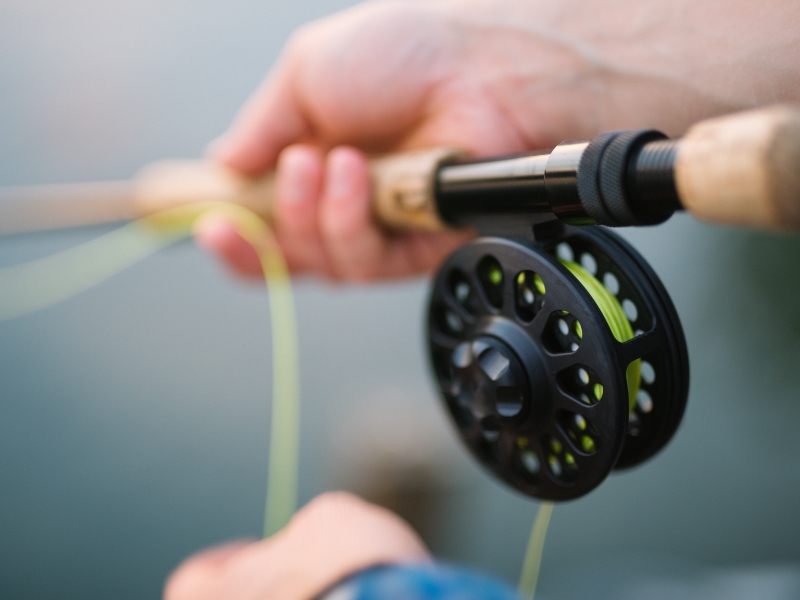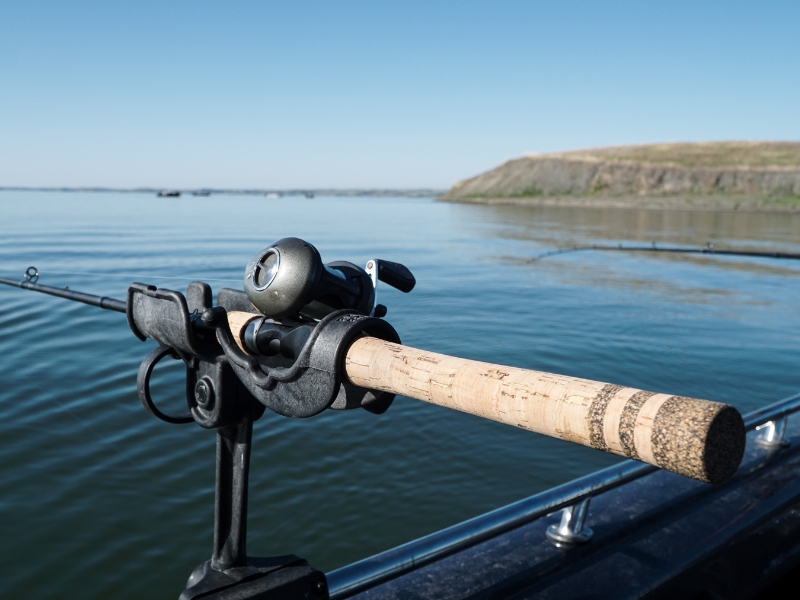At first glance, there does not seem to be a difference between a fishing pole and a fishing rod. So many people, even veteran anglers, use these two terms interchangeably. After all, both are used for the same purpose of fishing or angling. So, is there any difference between or are they the same thing?
A fishing pole is a simple device that has a fishing line attached to a tube. On the other hand, a fishing rod is a fishing pole with additional features such as a guide, a reel seat, and a reel. Basically, fishing rods are the modern, more sophisticated counterpart of fishing poles.
In this article, we will dive further into the details of these two fishing gears. We will be discussing the mechanisms by which they function. We will also go over the benefits and disadvantages each of them provides and deliberate which is conclusively better.
Fishing Pole

These are the traditional fish-baiting gears that were developed much earlier. For a lot of people, their first fishing experience came with a fishing pole, especially when they were young. Because it is very easy to learn and a fun way to pass the time.
Since they are more primitive, poles are generally crafted from natural resources. Materials such as bamboo, wood, cane, etc. are most often utilized for this purpose.
Nowadays, there are poles made from metal so that they are sturdier. But it is very common to see a young, enthusiastic kid casting a wooden pole on a day out with their father or grandfather.
Now, there is a variety among the types of fishing poles people use. The variation comes from how much weight the pole can handle and the area where it is being deployed. Typically, they are classified into two groups: freshwater poles and saltwater poles.
Freshwater poles are utilized in ponds and lakes. These come in different designs according to the fish you are targeting. Fly fishing poles are used to capture trout and are less heavy. Catfish poles are stronger and handle heavier targets. This is because catfish are bulkier, rowdier prey.
Saltwater poles are crafted for the ocean or surf areas on the shoreline. These are classified based on the weight of the different types of targets. So, different poles will offer different weight capacities.
The most notable distinction of a fishing pole compared to its modern equivalent is the lack of additional features. There are no complicated braking systems involved nor any fancy guide. It is a bare-bones capturing tool.
This simplicity offers some unique advantages in this game. The first thing that stands out is the high level of control and accuracy with which can cast. As this is a fairly basic contraption, the accuracy of your throw depends entirely on your skill. You do not need to worry about setting up the brakes or adjusting the reel. You just need to cast and wait.
This tool is also more silent and makes less of a splash. You can gently land the lure in the water, move it around and then retrieve it back. So, there is less chance of scaring your target away.
Plus, the far less complicated nature is in itself a nice trait a lot of the time. No chance of getting caught up in all the technicalities. Maintenance is also easier and is not very expensive. It really takes away so much of the stress and allows you to relax more.
The other significant edge it holds is in the cost department. We already mentioned that maintaining this equipment is very cheap. The cost of the whole setup is also cheaper compared to other types of gear. Moreover, you do not require much technical expertise to operate and maintain a pole.
On the other hand, using a fishing pole comes with its own challenges. There is a significant drop-off when it comes to mobility. If you are trolling in tight areas or need to make a difficult angle, then this will become a problem. This is especially true for longer poles as they are more difficult to maneuver.
The material is also a key factor. While they may be cheaper, they are more fragile than metal rods. The typical pole will not withstand rough conditions and really massive fish. Also, traditional poles are rarer in stores. So, availability may just become an issue for you.
Fishing Rod

These are more advanced tools and have only existed for a few centuries. They possess more mechanisms and functional features. Most anglers, professional or novice, will tend to use a rod as it offers more usage and convenience.
Additional features include a reel, a place for the reel to attach, and a guide. The reel consists of a spool that houses the line, a tension knob, a brake, a grip or handle, and a manual drag. The guide is there to assist the line when it is launched.
Modern rods are crafted exclusively from metal, alloy, or synthetic fiber. Graphite, fiberglass, copper, etc. are all used by different manufacturers. The quality and nature of the material will determine a lot of the characteristics of the final product.
They also come in a few categories. The most prominent varieties are bait casters, spinning rods, fly rods, surf rods, etc. Each of these varieties is suitable for certain situations.
Baitcasters are usually utilized to capture massive targets. Spinning rods are better for finesse techniques. Fly rods are for a different sort of sport called “fly fishing”. So, what sort of rod you choose depends on several factors, and picking the right one is key.
Fishing rods offer a set of pros that cannot be replicated by traditional poles. This is possible because of all the mechanisms built into these rods that make them technologically superior.
They allow you a much longer casting distance and let you cover more water. This is ideal for trolling a large body of water in a short amount of time. Not to mention that you have more control when making a long throw.
These gears work perfectly with a wide range of lines, lures, and baits. This is important for customizing your setup for a particular species or hunting ground.
Bulkier fish require stronger and heavier lines. Different species are attracted to different kinds of lures. Rods are just so much more flexible in this case and give you numerous options.
On the flip side, they possess a steeper learning curve. You really need to practice a lot before you become comfortable. Additionally, there are many aspects you have to adjust and configure to get maximum results.
What is the Difference Between a Fishing Rod and a Fishing Pole
Fishing poles are akin to the tools that early anglers used. They are simple, minimalistic, and efficient. Fishing rods are the advanced version of that established concept. They possess more components and require more proficiency.
Here is a side-by-side comparison of the two below:
| Fishing Pole | Fishing Rods |
| Minimal features and components | Many additional features and components |
| Less expensive | More expensive |
| Very easy to use | Has a higher learning curve |
| Little to no versatility | High level of versatility |
| No chance of technical malfunction | Potential technical problems like backlash |
| Short casting distance | Large casting distance |
| Not suitable for every fish species | Suitable for most species of fish |
Fishing rods are generally more expensive and require a great deal of maintenance. You may also face technical problems like a brake failure or a backlash. In exchange, they provide more options, better casting, and flexibility.
Fishing poles are for simpler use. They cost less and have low maintenance.
Which One is Better for You, Fishing Rod or a Fishing Pole
Most anglers today prefer fishing rods due to their extra features and functions. Rods provide more versatility and have a wider range of use. Companies are producing rods that negate some of their drawbacks to maximize their benefits.
However, this does not mean they are the superior choice in every scenario. Budget is a pivotal factor when buying equipment. And in almost every instance, rods are going to be more expensive.
You may also be someone that does not require the additional features. If you are someone who is in this as a lazy leisure activity, then a normal pole will accomplish your goals. Plus, if you are more comfortable using the simpler gear, you really do not have to change it. This way, you will save money and enjoy your pastime.
But if you are doing this as a serious passion or as a livelihood, then rods are almost exclusively better. They require a wider budget, better maintenance, and plenty of practice time. But trust me. They will be more than worth it.
Ultimately, fishing rods and poles are made for the exact purpose of capturing fish. One is simply more advanced than the other. But you should pick the one that suits your situation and needs better. As long as you catch your target, it does not matter which method you implement.